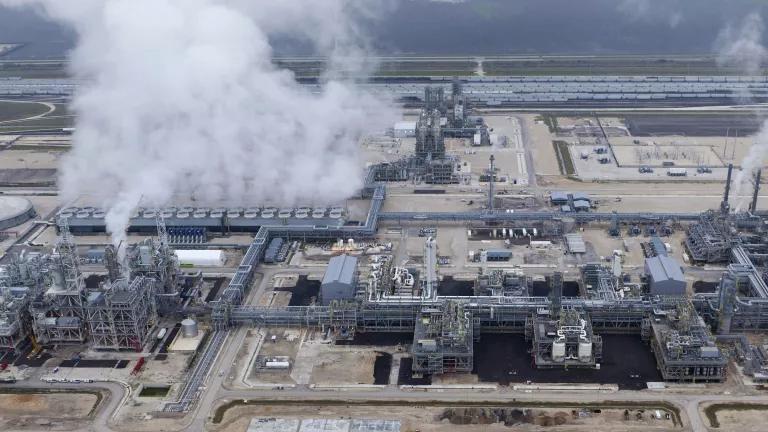Florida’s Proposed Fracking Ban Incomplete Without Acidizing

When newly-elected Florida Governor Ron DeSantis issued an Executive Order implementing major reforms to ensure the protection of Florida’s environment and water quality and opposing hydraulic fracturing—better known as “fracking”—many Floridians were ecstatic. Republican and Democrat state legislators have since proposed several bills to enact a fracking ban. However, the bills advancing through the Florida House and Senate fall short of protecting Florida’s sensitive natural resources because they do not include a ban of a more commonly used well stimulation technique in Florida known as “matrix acidizing” or “acidizing.”
Hydraulic fracturing, or fracking, is a technology that has allowed production of oil and gas from “unconventional” reservoirs across the United States. Hydraulic fracturing is a form of “reservoir stimulation”—broadly, a set of practices used to increase oil and gas production. Due to the state’s geology, hydraulic fracturing will likely not be a key technology for producing oil in Florida. However, a different well stimulation technique, known as “matrix acidizing” is more likely to be used.
The state’s oil and gas regulator, the Florida Department of Environmental Protection (FDEP), asserts that fracking has not been proposed for Florida oil and gas reserves, which are located in the Panhandle and south Florida, in and near the Everglades, due to the state’s geology, which has relatively high permeability compared to the tighter shale or similar formations fracked in other states. FDEP acknowledges that oil and gas operators in Florida prefer washing or flushing the formations with acid to open carbonate pathways to enhance recovery of oil and gas resources.
Acid matrix stimulation or “matrix acidizing” could allow greater exploitation of Florida’s unconventional oil. Acidizing dissolves portions of the oil‐bearing rock formations through the injection of acid mixed with water and other chemicals, allowing oil to more easily flow to the wellbore. Acidizing operations threaten the shallow aquifers that provide Florida with fresh drinking water. Scientists in California, where acidizing could also be used to unlock unconventional oil resources, found that acidizing operations pose many of the same threats to the environment and public health as fracking. These include threats such as spills and leaks of chemicals used for well stimulation and wastewater generated by drilling, fracking or acidizing, and subsequent production activities. Spills and leaks of oil and gas wastewater are one of the leading causes of environmental impacts from oil and gas operations, particularly impacts to water resources and soils.
These risks are too great for Florida, as groundwater is one of Florida’s most valuable natural resources. Around 93 percent of Florida’s population depends on groundwater for drinking water, far more than any other state in the nation. Florida aquifers are vulnerable to contamination because large areas are characterized by well‐drained sandy soils overlying porous limestone. A shallow water table and high rainfall increase the potential for contamination to reach the groundwater. Thus, the use of fracking and acidizing techniques should be extremely concerning to Floridians since they threaten to pollute their drinking water.
Conservation groups, including the Everglades Coalition, an alliance of over 60 local, state, and national conservation and environmental organizations, including NRDC, have resolved that the state should ban both fracking and matrix acidizing. Yet neither the Senate nor House bills advancing in the Florida legislature would ban the latter.
House Bill 7029 would ban hydraulic fracturing only. Senate Bill 7064 also fails to ban matrix acidizing, but includes requirements for drilling in the Everglades Protection Area, which was a response to Kanter Real Estate’s plan to drill an exploratory oil well on about five acres in the western Everglades. However, the Everglades Protection Area would not include the Big Cypress National Preserve, which has already suffered extensive damage from new oil exploration, including in habitat for the critically endangered Florida panther.
If the state’s oil and gas regulator acknowledges that matrix acidizing is more likely to be used to enhance oil and gas recovery in Florida, why won’t state legislators ban this risky practice in addition to fracking? The answer is simple—it’s because the oil and gas industry opposes it.
The Florida Petroleum Council contends that fracking is safe and creates a lot of jobs. However, NRDC recently obtained an expert economic report refuting these claims. Oil represents only a tiny sliver of Florida’s economic activity. The state contributes only a small percentage (less than 0.0006, one-sixteenth of one percent) of U.S. oil production. Thus, a statewide ban on fracking and matrix acidizing would pose little risk to Florida’s economy.

Despite industry opposition, Florida’s Commissioner on Agriculture, Nikki Fried, recently issued a proclamation calling on state lawmakers to halt the expansion of oil drilling in the Florida Everglades, and prohibit hydraulic fracturing, matrix acidizing, and other forms of fossil fuel exploration throughout the state. We hope that the Florida legislature will follow the Commissioner’s bold leadership to protect Florida’s sensitive natural resources.



